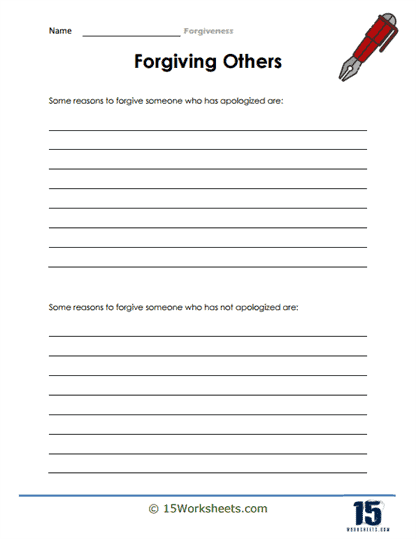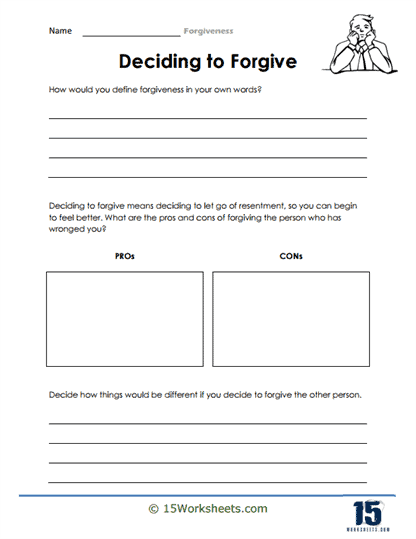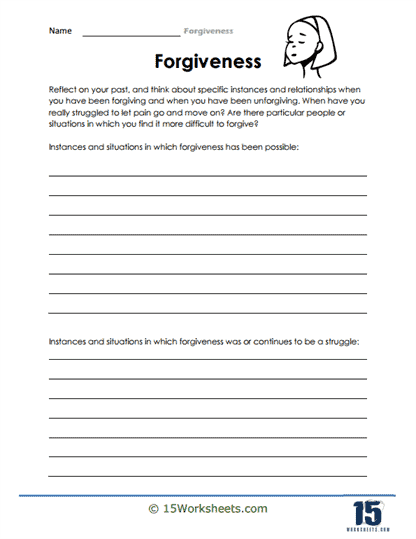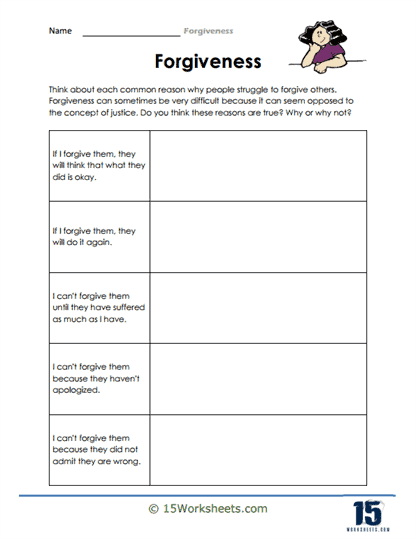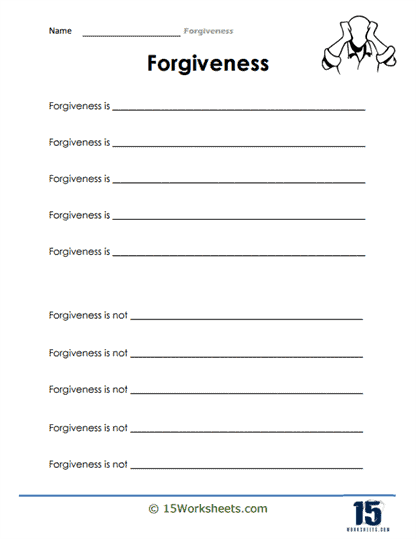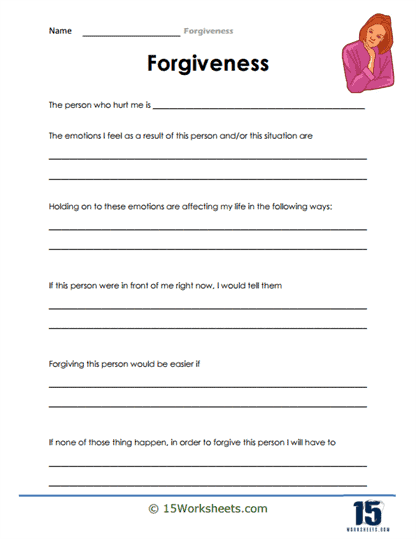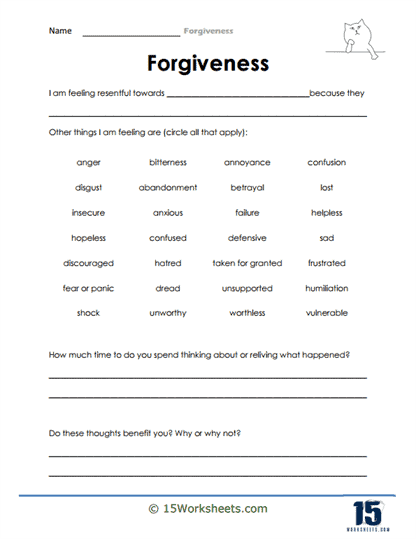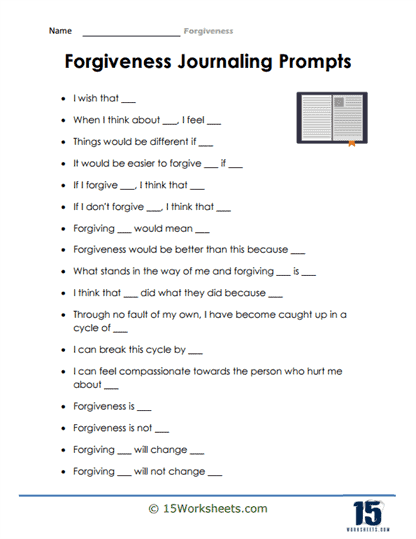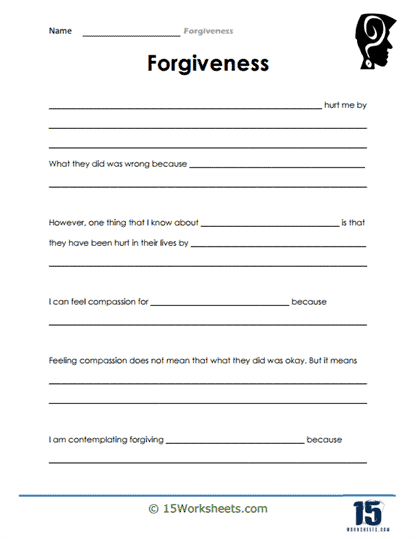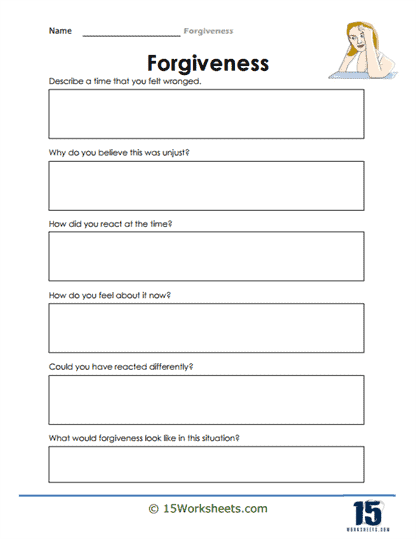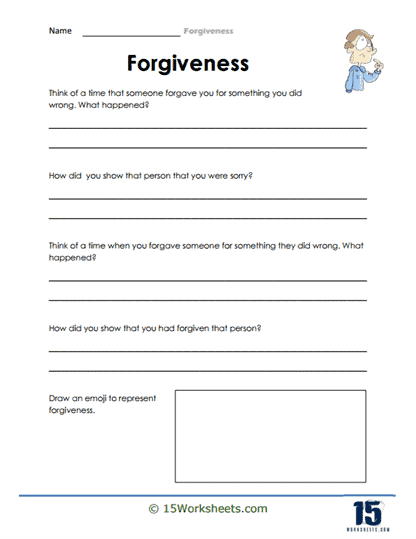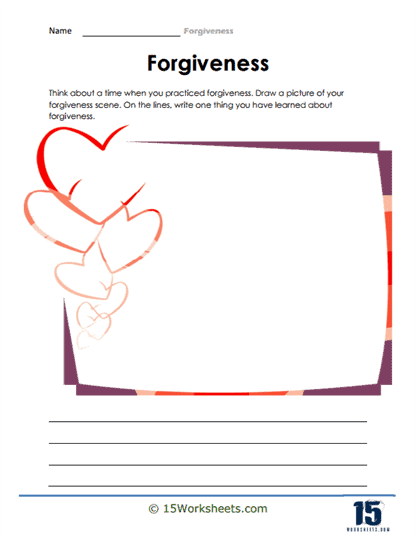Forgiveness Worksheets
All About These 15 Worksheets
Forgiveness is one of the most powerful acts we can engage in, and its potential to transform lives is immense. It’s not just about releasing someone from the burden of their mistakes; it’s a profound act of healing for ourselves. When we forgive, we open the door to empathy, growth, and renewed connections, creating space for deeper understanding and peace within. The process of forgiveness invites us to reflect, let go, and move forward in ways that build emotional resilience and foster personal development. This series of 15 worksheets on forgiveness is designed to guide students through this journey, providing them with the tools to explore, understand, and practice forgiveness in both their personal lives and relationships.
Each worksheet in this series delves into a unique aspect of forgiveness, offering students opportunities for self-reflection, personal exploration, and real-world application. The structure is thoughtfully crafted to help students peel back the layers of this complex emotional process. As they progress through the worksheets, students will be encouraged to engage deeply with their own emotions, examining past experiences where forgiveness might have been difficult or where unresolved emotions linger. Through this process of reflection, students will develop a clearer sense of self-awareness—an essential first step toward personal growth and emotional healing.
A critical component of this series is helping students understand the intricacies of human relationships and the profound impact forgiveness can have within them. By examining the role of forgiveness, students will recognize that it is not a simple, one-size-fits-all act. It requires understanding the nuances of human interactions, acknowledging the pain and hurt caused, and choosing a path forward. Through these worksheets, students will not only define forgiveness but also reflect on how giving and receiving it has shaped their own relationships. They will be challenged to consider the pros and cons of forgiving those who have wronged them, an exercise that will help them weigh the emotional and psychological benefits of letting go versus holding onto resentment.
The series also introduces students to the stages of forgiveness, breaking down the process into manageable, tangible steps. Forgiveness often begins with acknowledging one’s emotions—feeling the hurt, anger, or betrayal. This honest confrontation with feelings is essential before understanding the impact of the offense and ultimately making the conscious decision to forgive. Each worksheet guides students through these stages, helping them not only to intellectually understand forgiveness but to experience it emotionally, paving the way for genuine healing.
Self-forgiveness is another key focus of this series. Often, the hardest person to forgive is ourselves. We carry guilt, shame, or regret for things we’ve said or done, and this burden can be deeply damaging if left unresolved. The worksheets provide exercises that encourage students to reflect on moments of self-blame, and offer strategies to forgive themselves, thereby fostering greater emotional well-being. As students engage with these activities, they learn to treat themselves with the same compassion and understanding that they are encouraged to extend to others.
Students will explore the challenges of forgiving others, particularly in situations where trust has been broken. The series encourages critical thinking about what it means to forgive someone who has hurt us and how to effectively communicate that forgiveness. Importantly, the worksheets highlight the role of trust in relationships and the steps necessary to rebuild it. Students will reflect on how forgiveness is not necessarily synonymous with forgetting but involves making a conscious choice to release anger and resentment in order to move forward, while also safeguarding one’s own emotional boundaries.
By the end of this series, students will not only have developed a deeper understanding of forgiveness but also acquired practical tools for applying it in their daily lives. They will have cultivated empathy and self-reflection, essential qualities for maintaining healthy and positive relationships. Letting go of grudges and embracing forgiveness as a transformative process will empower them to move through life with a greater sense of peace and emotional balance. Ultimately, these worksheets aim to inspire students to contribute to a more compassionate, understanding, and forgiving society—one where healing, rather than harm, becomes the cornerstone of human connection.
Tips For Teaching Forgiveness
Teaching children forgiveness is an important life skill that helps them develop empathy, emotional intelligence, and healthy relationships. Here are some strategies to teach children to be better at forgiveness:
Model Forgiveness
Children learn from observing the behavior of adults around them. Be a role model by demonstrating forgiveness in your own relationships and interactions. When you make a mistake or have a disagreement with someone, show your child how you apologize, forgive, and move on.
Discuss the Concept
Talk to your child about what forgiveness means and why it’s important. Explain that forgiveness doesn’t mean forgetting or excusing the wrong actions, but rather, it means letting go of negative feelings and not holding a grudge.
Encourage Empathy
Help your child develop empathy by encouraging them to consider other people’s feelings and perspectives. Ask questions like, “How do you think your friend felt when that happened?” or “Why do you think they acted that way?” This helps your child understand that everyone makes mistakes and that understanding others’ emotions is an essential step in forgiving.
Teach them to Apologize
Teach your child the importance of apologizing when they’ve made a mistake or hurt someone’s feelings. Encourage them to use sincere words and actions to show they are sorry and understand the impact of their actions.
Practice Active Listening
Encourage your child to listen carefully when someone is expressing their feelings, without interrupting or becoming defensive. Teach them to acknowledge the other person’s feelings and take responsibility for their actions when necessary.
Use Stories and Role-playing
Share stories, books, or movies that demonstrate forgiveness and discuss the characters’ actions and feelings. Engage in role-playing activities to help your child practice forgiving and seeking forgiveness in various scenarios.
Provide Guidance and Support
Help your child navigate difficult situations involving forgiveness by offering guidance and support. Encourage them to express their feelings, consider the other person’s perspective, and make a conscious decision to forgive.
Reinforce Positive Behavior
Praise your child when they demonstrate forgiveness, empathy, and understanding. Acknowledging their efforts can help reinforce these positive behaviors.
Be Patient
Learning to forgive is a process that takes time and practice. Be patient and understanding as your child develops this skill, and offer guidance and support along the way.
Encourage Open Communication
Create an environment where your child feels comfortable discussing their feelings and concerns. Open communication can help them process emotions and learn how to forgive and move on from negative experiences.
By teaching children the importance of forgiveness and providing them with the tools and guidance they need, you can help them develop strong emotional intelligence, empathy, and the ability to navigate healthy relationships throughout their lives.




